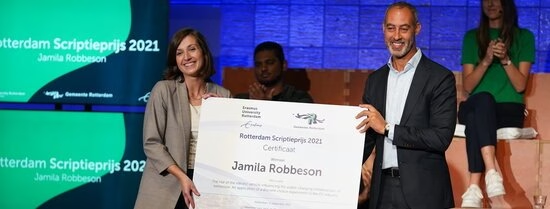Climate-neutral by 2050. That is the spot on the horizon towards which the city of Rotterdam is working. Approximately one-third of the CO₂ emissions are caused by mobility and transport. The City of Rotterdam has put electric transport high on the sustainability agenda. Jamila Robbeson from Erasmus School of Economics has written an innovative and relevant thesis on consumer preferences regarding public charging infrastructure. Therefore, she has won the 9th Rotterdam Thesis Award.
Charging infrastructure preferences
Rotterdam has traditionally been a traffic and fossil-fuel-oriented city. The realisation of the energy transition to more electric transport consequently poses many challenges for Rotterdam. Many of the city's residents do not have their own private parking spaces and are therefore dependent on the public charging infrastructure.
Jamila Robbeson used various research methods to map out consumer preferences regarding the public charging infrastructure. She asked respondents to choose between public charging stations that differ in three ways: charging price, distance to charging station (from home), and availability. The results show that all three aspects are of distinctive importance for choosing a charging station, but the charging price stands out above them all.
Dynamic pricing
To make her research practical, she examined the business case for a charging station. Based on the current demand, it is often not economical. Especially the connection to the energy grid is costly. In addition, the higher the charging speed, the more expensive the grid connection is. But minimising the charging time is not always necessary or desirable, as it depends on the activity at the charging location, such as working, living, recreation, visiting, etc. Therefore, it is essential for all stakeholders to cluster the connection of charge points and introduce dynamic pricing based on charging speed/time to improve the business case of the charge point.
Jury chairman Prof. Martijn van der Steen 'We find Jamila's thesis innovative, versatile, and relevant to Rotterdam. We were impressed by the different methodologies, which she applied in an excellent way. By preparing a business case, she also made her thesis practical and quickly applicable. The thesis is pleasant to read, and besides providing insight into concrete research results, it also gives a clear introduction to the complex issue of electric transport and charging infrastructure. That is a good job.’
Currently Jamila is a management trainee at BMW Netherlands. In the future, she would like to promote the application of electric mobility in the Netherlands. She wrote her thesis: The rise of the electric vehicle influencing the public charging infrastructure of tomorrow: An application of a discrete choice experiment in the EV industry for the master Urban, Port and Transport Economics (Erasmus School of Economics) under the supervision of Dr Giuliano Mingardo.
About Rotterdam Thesis Award 2021
To encourage students to use their academic knowledge for the benefit of Rotterdam, the City of Rotterdam and Erasmus University Rotterdam have established the Rotterdam Thesis Award. The jury looks at the relevance for Rotterdam and its scientific quality. The prize consists of a certificate, a work of art by a Rotterdam artist and a cash prize of 1500 euro.
In addition to this year's winner, there is an honorable mention for the thesis: Scientia potentia est? A diverse cases analysis of the process through which citizen science coalitions attempt to change Dutch air quality policy and the way it is made, by Jurre Honkoop, for the master Governance and Management in the Public Sector (ESSB)
To encourage students to use their academic knowledge for the benefit of Rotterdam, the City of Rotterdam and Erasmus University Rotterdam have established the Rotterdam Thesis Award. The jury looks at the relevance for Rotterdam and its scientific quality. The prize consists of a certificate, a work of art by a Rotterdam artist and a cash prize of 1500 euro.
In addition to this year's winner, there is an honorable mention for the thesis: Scientia potentia est? A diverse cases analysis of the process through which citizen science coalitions attempt to change Dutch air quality policy and the way it is made, by Jurre Honkoop, for the master Governance and Management in the Public Sector (ESSB)
- More information
For more information, please contact Marjolein Kooistra, press officer Rotterdam thesis award: kooistra@essb.eur.nl, +31 6 83 676 038 or Ronald de Groot, Media & Public Relations Officer Erasmus School of Economics: rdegroot@ese.eur.nl, +31 6 53 641 846.

